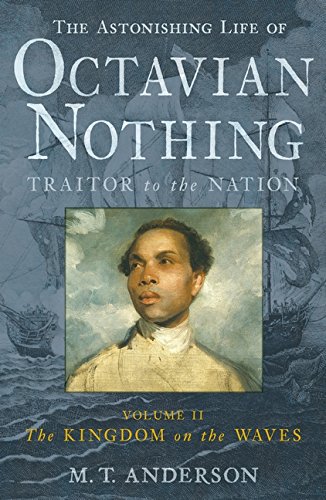-
The Missing Movie Creature
Mary Anderson
Paperback (Yearling, May 1, 1989)Cassie and Barney, her nine-year-old cousin, accompany Aunt Alex to Hollywood to investigate the possibility of sabotage on the set of a new horror movie P
P
-
The Nutcracker
Ann Marie Anderson
Paperback (Templar, Sept. 1, 2012)None
-
Comanche and His Captain
A. M. Anderson
Hardcover (Harper and Row, March 15, 1965)INDIAN BOOK
-
HAUNTING/HILLCREST
Mary Anderson
Paperback (Yearling, Aug. 1, 1987)When a mysterious stranger threatens the Hillcrest Academy, Amy uses her psychic powers and the help of her twin brother, Jamie, to solve the mystery P
P
-
By Laurie Halse Anderson Speak
Anderson
Paperback (Speak, Paperback(2001), Jan. 1, 2001)Speak (99) by Anderson, Laurie Halse [Paperback (2001)]
-
Freaks of Greenfield High
Maree Anderson
(Maree Anderson, March 10, 2015)Jay’s a cyborg who looks just like normal teenage girl. She’s super-strong, super-smart, and she can even appear to age like a human. When a covert organization intent on using Jay as a weapon comes after her, she needs to find a place where she can blend in. Greenfield High seems perfect… except that the boys all think she’s totally hot and keep hitting on her, and she has no clue how to handle the attention. Who knew high school could be so perilous? To add to her confusion she’s evolving – experiencing human emotions for the first time. And when she encounters ex-jock-turned-outcast Tyler, he sends her logical brain into a spin. She’s just starting to get the hang of this girlfriend/boyfriend thing when her pursuers track her down. Now’s sooo not the time for a cyborg to fall in love and get all emotional!
-
The Curse of the Demon
Mary Anderson
Paperback (Yearling, July 1, 1989)Cassie and Barney take a cruise to the Yucatan for fun and relaxation, but when a vengeful Mayan god comes to life and seeks revenge for his stolen jewels, the two young sleuths must solve the mystery.
-
Where the Money Lies: A Non-Partisan Guide to Trump Economics
Max Anderson
Hardcover (Dog Ear Publishing, LLC, Feb. 26, 2019)Where the Money Lies: A Non-Partisan Guide to Trump Economics by Max AndersonMaking an informed decision before casting a vote has never been harder. Complicated issues are oversimplified and delivered as tweets and sound bites. News is more fragmented and more partisan, sources of information are more opaque (sometimes even turning out to be our foreign adversaries), and networks increasingly rely on outrage over thoughtful analysis to build their audiences. It is easy for voters to becoming overwhelmed and disenfranchised. An estimated 58 percent of eligible voters showed up at the polls during the 2016 presidential election. That means 42% of eligible voters did not vote, despite the fact that the subsequent four years would have a huge impact on their individual lives and prosperity. I embarked on a journey to help encourage young, eligible and disenfranchised citizens to vote. Through Vote.net, the website I founded and operate, and through Where the Money Lies, I strive every day to get young voters interested in the political process. They respond, sometimes out of anger or fear, but more often out of an understanding that every vote is equally critical. For ourselves, for our country, we need to exercise our right to vote and show up for both the primaries and the election itself. While a single vote might not seem to make or break an election, an entire social circle could very well be that extra push to get a candidate elected. When lower-income voters do show up at the polls, we often are puzzled why they don't vote in ways aligned with their own self-interests. Why do poor people often vote for tax breaks for the wealthy? Why do rural voters often go out and vote against federal infrastructure initiatives? Why do sick people frequently vote for restrictions in healthcare?Often, voters are simply frustrated with the status quo. Other times, they are led to believe that a specific social issue or social group pose some sort of urgent threat, which, in fact, is rarely the case. The false sense of urgency distracts from the actual matters that they should be focused on, and therefore lead to less-than-optimal conclusions. Where the Money Lies, provides a non-partisan guide to economic issues that have been brought to the forefront by the Trump "America First!" platform. These policies have been quietly implemented since Trump's inauguration and dramatically impact us all-- our health, education, employment, taxes, retirement, food and water, and even how we access the internet.
-
The Terrible Thing in the Bottle
Mary Anderson
Paperback (Yearling, June 1, 1989)Cassie and her cousin Barney have a run-in with Cassie's boarding-school nemesis, Vicky, and begin to think she may have cast a spell on them Y
Y
-
Astonishing Life of Octavian Nothing, Traitor to the Nation,
M Anderson
Paperback (Walker Childrens Paperbacks, Aug. 16, 2009)A fascinating portrait of betrayal - part gothic tale, part historical fiction - set against the backdrop of tragedy, slavery and war. In the second volume of The Astonishing Life of Octavian Nothing, Octavian and Doctor Trefusis escape to Virginia where Octavian joins up with Lord Dunmore's troops, following the famous proclamation promising to liberate any slave that will fight for the British in the Revolutionary war. While there, Octavian reunites with Bono, fights in vicious battles, and falls desperately in love.
-
My Small Backyard: Birds!
Mary Anderson
Paperback (XLIBRIS, Sept. 21, 2012)Enjoy reading these fun, timeless stories out loud with your child. Each story is about a different bird you might fi nd in your backyard, with facts about each bird, and photographs from the author's backyard. 1. Northern Cardinals fi nd food after a winter storm - yum! 2. A Carolina Chickadee fi nds a new home - cozy! 3. A Mallard Duck mother protects her ducklings from danger - whew! 4. A male Ruby-Throated Hummingbird protects his food source and territory - fi erce! 5. A Blue Jay family fi nds their favorite treat - yeah!
-
Werewolf Love: No Death Do Us Part
M.M. Anderson
language (Little Shop of Writers, June 23, 2015)Seamus Sullivan never asked to become a werewolf, but in this second book of the series he's adjusted well to undead life in a world where werewolves, plumed pirates, a Russian rogue, performing clowns, gourmet spaghetti sauce, and exploding toilets all have something in common-- love everlasting. Full of innocence and terror, surprises and amusements, WEREWOLF LOVE was written for every adventurous romantic who's ever wished that no death do us part.